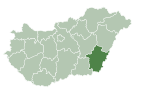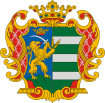Elek
Elek | |
|---|---|
 Monument of the deported Germans | |
| Coordinates: 46°31′41″N 21°14′49″E / 46.528°N 21.247°E | |
| Country | |
| County | Békés |
| District | Gyula |
| Area | |
• Total | 54.94 km2 (21.21 sq mi) |
| Population (2012) | |
• Total | 4,816 |
| • Density | 101/km2 (260/sq mi) |
| Time zone | UTC+1 (CET) |
| • Summer (DST) | UTC+2 (CEST) |
| Postal code | 5742 |
| Area code | (+36) 66 |
| Website | www |
Elek (German: Renndorf, Romanian: Aletea) is a town in Békés County, in the Southern Great Plain region of south-east Hungary.[1] Until the Second World War, the town was home to the largest concentration of Germans in the county, with its population consisting almost entirely of Swabians. Jews lived in the city as early as the 19th century and in 1944 many of them were murdered by the Nazis in the Holocaust.[2][3]
Geography
The town covers an area of 54.94 km2 (21.21 sq mi) and had a population of 5,567 in 2002.
History
- 1232 : First mentioned
- 1566-1696 : Ottoman rule (Ottoman wars in Europe)
- 1724 : settling of German colonists (predominantly from Franconia)
- 1739 : Bubonic plague
- 1894 : Artesian aquifer
- 1920 : Elek becomes border town (Treaty of Trianon)
- 1946 : Expulsion of German inhabitants
- 1996 : Elek gains town status
|
Twin towns
Elek is twinned with:
- Gerolzhofen, Germany (1990)
- Alerheim, Germany (1992)
- Leimen, Germany (1992)
- Sebiș (Borossebes), Romania (1992)
- Gerlingen, Germany
- Laudenbach, Germany (1994)
- Veľké Kapušany (Nagykapocs), Slovakia (1996)
- Grăniceri (Ottlaka), Romania (1997)
- Dumbrava (Igazfalva), Romania (2019)
References
- ^ "City (town) Elek: map, population, location". www.tiptopglobe.com. Retrieved 8 May 2017.
- ^ Documentation of the city's Jews who were murdered in the Holocaust
- ^ Hungarian Jewish census
External links
- Official website in Hungarian
46°32′N 21°15′E / 46.533°N 21.250°E





